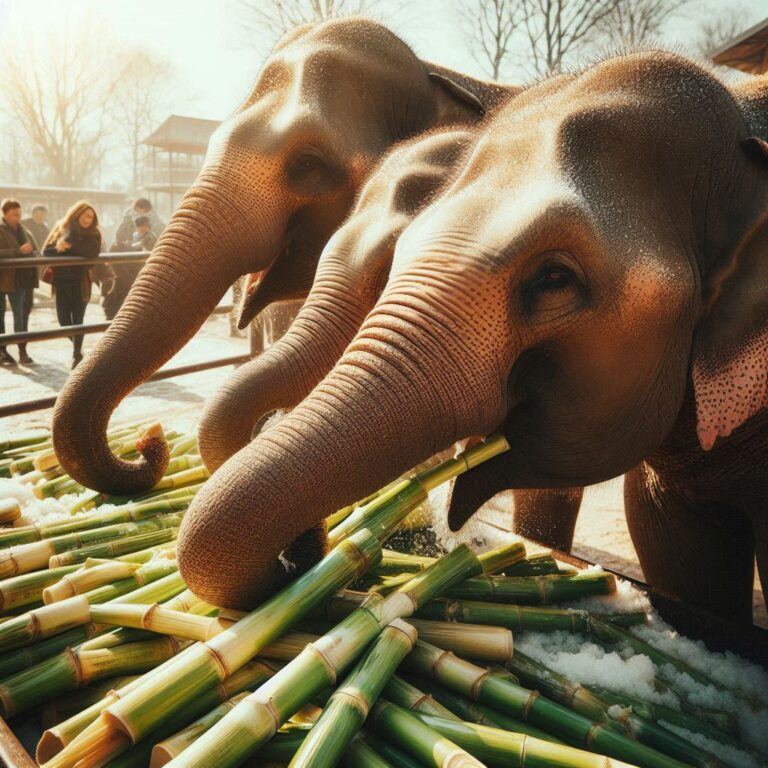Can Elephants Safely Eat Hay
Yes, elephants can safely eat hay. Hay plays a crucial role in their nutrition, providing essential fiber necessary for their digestive systems. This staple food is common in zoos, sanctuaries, and even in the wild because of the numerous benefits it offers.
Hay is rich in nutrients like carbohydrates, proteins, vitamins, and minerals. These nutrients are vital for maintaining an elephant’s health.
The fibrous nature of hay helps with digestion, promoting proper bowel function and preventing issues like constipation.
It gives elephants the bulk they need in their diet, similar to the grasses and leaves they eat in the wild.
Compared to other food sources like fruits and vegetables, hay is a more balanced and sustainable option.
While elephants do love their fruits, the high sugar content isn’t ideal for them in large quantities. Hay, on the other hand, can be consumed in larger amounts without the risk of unhealthy weight gain or other health problems.
Zoos and sanctuaries rely on hay as a primary food source because it mimics the natural diet of elephants. It’s cost-effective, easy to store, and keeps well over time.
Elephants enjoy munching on hay throughout the day, which keeps them engaged and reduces boredom. It’s a safe, practical, and nutritionally sound choice for these magnificent animals.
The Nutritional Benefits of Hay for Elephants
Hay is packed with essential nutrients that elephants need to stay healthy. It’s rich in proteins, which are important for muscle development and maintenance.
These proteins play a critical part in the growth process, especially for younger elephants.
Additionally, hay contains a good amount of carbohydrates. Carbs provide the energy elephants need to move around, play, and go about their daily activities.
This source of energy is crucial as elephants are active animals that require a substantial caloric intake to sustain their large bodies.
Hay also provides a range of vitamins and minerals. For instance, it contains calcium and phosphorus, which are vital for bone health.
Strong bones are important for elephants, given the immense weight they carry. Fruits and other treats might add variety to their diet, but they often lack these essential nutrients in the right proportions.
Fiber content in hay cannot be overstated. The high fiber helps maintain a healthy digestive system. It supports regular bowel movements and prevents digestive issues.
Fiber also aids in nutrient absorption, ensuring that elephants get the most out of their food.
Several studies and expert opinions back the benefits of hay. Veterinary nutritionists often recommend hay due to its balanced nutrient profile.
Many zoos and wildlife sanctuaries have observed better overall health and well-being in elephants that primarily eat hay. It’s worth noting that not just any hay will do; quality matters.
Considerations and Best Practices for Feeding Elephants Hay
Feeding elephants hay requires some considerations to ensure safety and health. One potential risk is the quality of the hay.
Poor-quality hay can be dusty, moldy, or contain harmful plants. It’s critical to source high-quality hay that’s clean, fresh, and free from contaminants.
It’s advisable to buy hay from reputable suppliers who understand the dietary needs of elephants.
Orchards, timothy, and alfalfa hays are some of the commonly recommended types. However, diversity is key, so mixing different types can provide a well-rounded diet.
Quantity is just as important as quality. While hay is safe, it’s best to avoid overfeeding. Setting specific feeding times and portions helps maintain a balanced diet.
Each elephant’s needs might vary based on age, size, and health status, so customized feeding plans are often beneficial.
Another best practice is to monitor the elephants regularly. Keep an eye on their digestion and overall health. Consistent checks can help spot any issues early on.
If an elephant shows signs of digestive distress or loses interest in eating, it might be time to review their diet and consult a veterinarian.
Caretakers should also be mindful of the storage conditions for hay. It should be stored in a dry, well-ventilated area to prevent mold growth.
Inspect the hay regularly and discard any that appears compromised. Proper storage ensures that hay remains a nutritious and safe food source.
Expert recommendations often emphasize variety. While hay should be a significant part of the diet, supplementing it with fresh vegetation, fruits, and specially formulated elephant feed can provide a balanced nutrition profile.
This approach mimics their natural foraging behavior and keeps them mentally engaged.
Following these best practices ensures that elephants not only enjoy their meals but also receive the nutrients they need to thrive.







